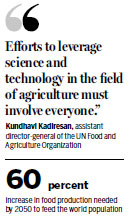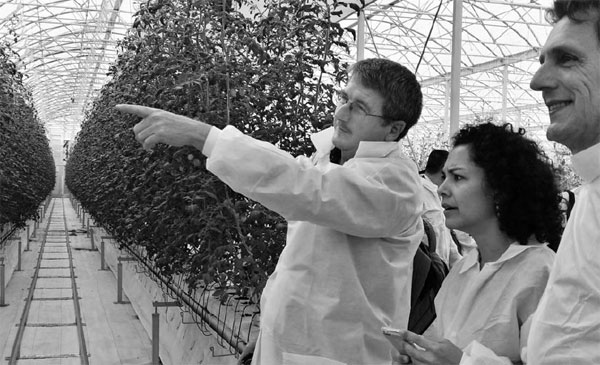Sustainable agriculture key to eradicating poverty
Innovation in global food production is vital to providing the world with enough to eat and helping the poor
At the fifth Global Forum of Leaders for Agricultural Science and Technology in Lingshui, Hainan province, last week, experts reached the consensus that scientific and technological innovation is vital for sustainable agricultural development, and is therefore critical to global food security and poverty elimination.
Agricultural leaders and experts at the conference called on governments and the private sector to invest more in agricultural science and technology innovation.
"History and data once again proved that science and technology play a significant role in conserving and using crop and animal diversity, scaling up production, enhancing the added value of agricultural produce, increasing farmers' income and reducing poverty," said the meeting's Lingshui Declaration.

With the theme of "Eliminating hunger and poverty through S&T innovation", the three-day forum was co-hosted by the Chinese Academy of Agricultural Sciences, the Food and Agriculture Organization of the United Nations, the Consultative Group of International Agricultural Research and the government of Hainan. The event was co-organized by the Hainan Academy of Agricultural Sciences, Hainan Provincial Department of Agriculture and the government of Lingshui Li autonomous county.
The forum drew 210 delegates from research institutes and universities from 52 countries and regions, international organizations and multinational corporations.
Technology sharing
Initiated by the Chinese Academy of Agricultural Sciences, with support from national and international agricultural organizations and agencies, the forum has become a platform for developing solutions to global food security challenges.
It is also a platform for leaders and scientists to exchange ideas, share experiences, and promote mutually beneficial co-creation of science and technology knowledge and applications.
The platform particularly focuses on aiding small farmers in meeting market demands and on enhancing science and technology transformation and adoption in poor regions through innovative and context-specific approaches.
The forum reached an unequivocal consensus that it is critical to establish a long-term collaboration mechanism to meet the emerging agricultural challenges in the rapidly changing globalization era, contributing to global extreme poverty eradication and overall poverty reduction by 2030, as stated in the UN 2030 Agenda for Sustainable Development.
Agricultural officials showed their strong support and spoke highly of the meeting's proposals.
Eliminating poverty
Qu Dongyu, Chinese vice-minister of agriculture, told the forum that the Chinese government has always attached great importance to the elimination of poverty and improving people's daily life by applying agricultural science and technology.
"History and data show that science and technology have provided solid support in reducing hunger and poverty in the world," Qu said, citing the success of 86-year-old Chinese academician Yuan Longping as an example.
Yuan, commonly known as "the father of hybrid rice" in China, recently achieved an annual output of 1,537 kilograms per mu (0.067 hectare) for his double-season super rice this year, breaking the current world record of 1,500 kg.
"China is willing to share with all other countries its experience and development in the application of science and technology to promote agricultural growth and eliminate poverty," said Qu.
Tang Huajun, president of the Chinese Academy of Agricultural Sciences, said science and technology have proven to be effective weapons in the fight against poverty.
The academy has launched State-level agricultural science and technology innovation projects and established a national agricultural science and technology innovation alliance with other ministries, according to Tang.
"CAAS is willing to cooperate with partners, international groups and the private sector around the world to introduce and exchange science and technology in a bid to further reduce poverty on a global scale," said Tang.
The United Nations Food and Agriculture Organization estimates that the world will need to produce some 60 percent more food, on average, to feed a hungry world by 2050, when the global population is expected to top 9 billion.
"Innovation must benefit the many. Efforts to leverage science and technology in the field of agriculture must involve everyone, from a country's leading researcher to the farmer's family working in the field," said Kundhavi Kadiresan, assistant director-general and regional representative for Asia and the Pacific at the FAO.
"We need to develop the capacity for innovation on smallholder farms. The skills and capacities of individuals involved in all aspects of the agricultural innovation system - farmers, extension service providers and researchers - all of these must be upgraded through education and training at all levels," she said.
"But the world needs more than just more food in the years going forward, researchers need to focus on developing and growing more nutritious foods to ward off micronutrient deficiencies," said Fan Shenggen, director-general of the International Food Policy Research Institute.
mazhiping@chinadaily.com.cn
|
Participants in the fifth Global Forum of Leaders for Agriculture and Technology visit the China-Dutch Protected Agriculture Demonstration Zone on Dec 15 in Lingshui Li autonomous county, Hainan province. Ma Zhiping / China Daily |
(China Daily 12/21/2016 page17)









